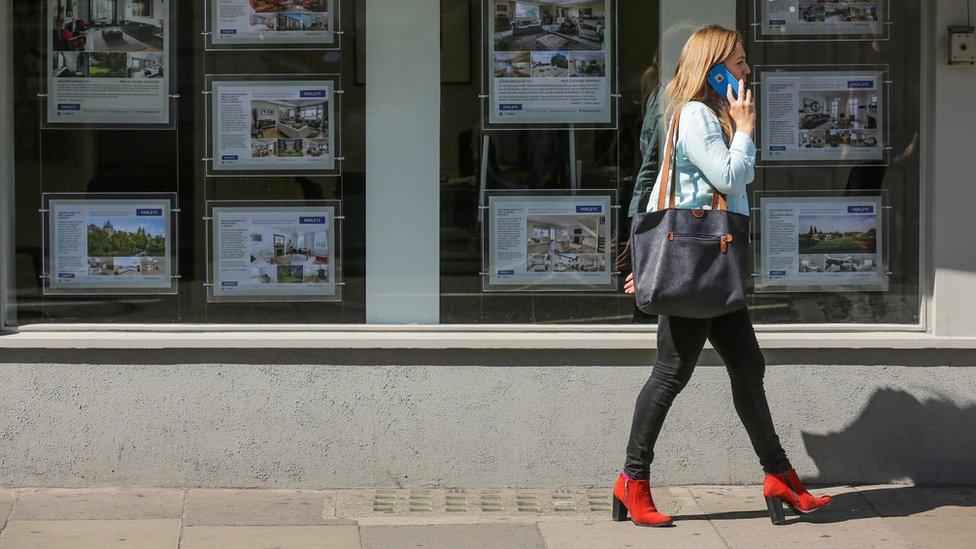Affordable rent measures promised in housing White Paper
- Published
Housing Minister Gavin Barwell tells Andrew Neil the government’s record on building affordable homes is "embarrassing"
The government is promising a new emphasis on people who rent their homes when it unveils its housing strategy for England this week.
Housing Minister Gavin Barwell said there would be minimum tenancies and more homes built for rent in a "change of tone" from previous Tory policy.
He said the government had not given up making home ownership available to all.
Labour leader Jeremy Corbyn said the rental market was "incapable of giving people the security they need".
Speaking on the BBC's Sunday Politics, Housing Minister Gavin Barwell said a package of measures would be in the White Paper due to be published on Tuesday.
These will aim to encourage more investment in building homes for affordable rent, which he defined as at least 20% below the market rate, with councils encouraged to get more involved.
Ministers have previously announced letting agents in England will be banned from charging fees to tenants.
'Broken housing market'
The last Conservative general election manifesto said "everyone who works hard should be able to own a home of their own", and Mr Barwell said the government was still committed to reversing the decline in home ownership.
But he said the government also had to have "something to say" to renters who were facing unaffordable costs.
There are an estimated 4.3 million tenants in the private rental market.
"Whether you're trying to buy or you're trying to rent, housing in this country has become less and less affordable because for 30 or 40 years governments have not built enough homes and this White Paper is fundamentally trying to do something about that," Mr Barwell said.
The focus on rentable homes was welcomed by Rico Wojtulewicz of the House Builders' Association, which represents small and medium-sized house builders.
Mr Wojtulewicz said that if small and medium enterprises were better enabled to build, "you get the right type of homes in the right areas".
He told the BBC: "Concentrating too much on volume house-building, as we've seen in the last decade, is problematic - not just for supply, but the type of supply."
Rob Warm from the National Housing Federation said many people in the rented sector are receiving a "very poor" and "insecure service".
He said:" I think those people deserve better and what government is saying today shows that they think these people deserve better as well."

'Cherished notion'
Mark Lobel, BBC political correspondent

It's been a long-cherished notion in the Conservative Party that people want to own their own homes.
From Margaret Thatcher's sale of council houses in the 1980s, to David Cameron's Help to Buy scheme offering generous loans for first-time buyers.
In the forthcoming housing White Paper, Help to Buy and other schemes should remain but the Housing Minister Gavin Barwell said people should expect a change of tone too.
More help is promised for those who cannot afford to own, or prefer to rent - by cutting rents and increasing the length of tenancy agreements.
Planning rules will be amended to allow more homes to be built for rent and developers will be encouraged to offer cheaper rents in lieu of their affordable home obligations.

Mr Barwell acknowledged that the most recent figures showing the number of new affordable homes at a 24-year low were "embarrassing", but said this was because they came at the start of a new five-year programme.
And he insisted the government was committed to building one million new homes in England by 2020, despite being "behind schedule".
He said the government would not make any changes to the current rules on the green belt, which allow building only in "exceptional circumstances".
"This idea that we can only fix our broken housing market by taking huge swathes out of the green belt is not true," he added.
But Labour has said the proposals on build-to-rent fall far short of what is needed.
Mr Corbyn added: "The private rented market is incapable of dealing with demand, incapable of giving people the security they need, and particularly in our major cities, it is so expensive that it means many poorer, middle-income, working-class families are getting moved out."
He called for investment in council housing and regulation of the private rented sector.

